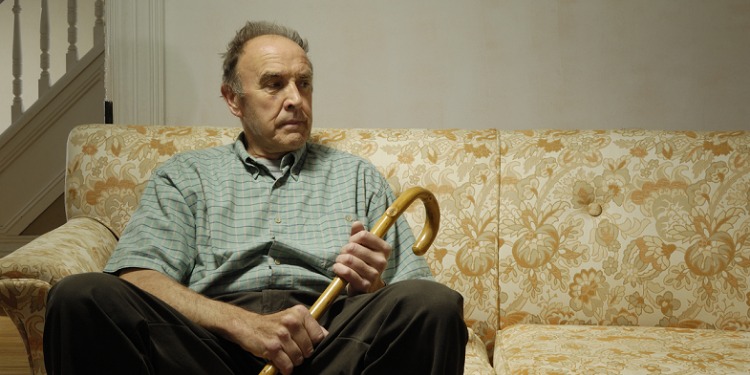Project Spotlight: Kupat Yedidut
The Fellowship | March 15, 2016

An Open Mind and Generous Heart for Those in Poverty
Too often, we assume the poor are at least partially, if not completely, responsible for their dire predicament. However, after working with The Fellowship and getting to know so many impoverished people who desperately need our help, for me this stereotype has been shattered. I have seen with my own eyes how many hard-working, motivated individuals found themselves without money for housing, food, medicine, and other basic living necessities due to circumstances that are completely out of their control.
On a recent visit to the city of Hadera, Israel, I met Shalom, who defies the stereotype many of us have, or at least had at one time or another, of poor people. Shalom never thought he would need to ask for help. He had served as a combat soldier in the Israeli army, volunteered in the Israeli Police Force as an auxiliary officer, and at one point owned a small yet profitable construction company.
However, due to a debilitating injury, Shalom lost his business and his ability to work. Now he has found himself in dire straits, needing to ask for financial help just so he and his family won’t be out on the streets.
At age 50, Shalom lives with his wife and two kids in an old, dilapidated two-bedroom apartment. I recently met him after he had received Fellowship aid through our Kupat Yedidut project, which serves as an emergency fund for the poor who need immediate assistance. In Shalom’s case, The Fellowship‘s Kupat Yedidut gave him a $1,000 grant to pay his landlord for many months of rent he owes him, hoping to avoid pending eviction.
“How can I thank you enough? If not for The Fellowship, my family and I would be out on the streets,” Shalom explained.
Meager Beginnings
Shalom grew up in Hadera, Israel, in a family of eight. His parents had moved to Israel from Tunisia, and were hard-working individuals; nonetheless, they lived a very meager life. When Shalom turned 18, he joined the Israeli army and served proudly in a combat unit, which saw action in the first Lebanon War.
“I served in the tanks division,” Shalom said with a proud smile. “The fiercest battles I participated in were fought in the first Lebanon War.”
Shalom has spent a lifetime serving his country, and this attitude of devoting his life to Israel has permeated his personal life. “I served in the army, fought battles in the first Lebanon War, and after 20 years of reserve duty, I volunteered as an auxiliary cop.”
In fact, during the incident that led to his debilitating injury, he showed this devotion without any hesitation. On the day of his injury, there was a robbery in progress, and Shalom could not simply stand by. “I was off duty and did not have any weapons,” he recalled. “But when I saw the robber within reach, I wrestled him to the ground until others were able to secure the situation.”
The next day, Shalom could not get out of bed. “My back gave out, and I could not stand on my two feet,” he explained. Even after years of treatments and surgery to try to fix his back problems, his situation only worsened. Now, he can no longer walk without assistance.
Impossible Choices
“Since the injury, I can no longer work. And to make matters more difficult, my wife has been ill, and she too can no longer earn a living,” Shalom explained. Shalom’s wife has been slowly going deaf for a number of years. She has sought medical help and has had surgeries, yet no cure can be found. She wears extensive hearing-aid devices, which have led to numerous infections in her ears. Beyond the pain and suffering this causes her, they are forced to spend a hefty sum of money just to pay for her medicine and other medical treatments.
Unfortunately, because of their poverty, they must choose between food or medicine, and between winter heating or buying their children sweaters for the winter. And over the past few months, they had no money for rent.
“Our landlord is a good man who understands our situation,” Shalom explained, “and so he let us delay our rent payment. But when our debt grew to a large sum, his hands were tied and he began the process of evicting us.”
Shalom and his wife, Dorit, had nowhere to turn. Their landlord said if they didn’t come up with at least half of what they owe, he would have no choice but to evict them.
“This Aid Is a Lifesaver”
“We showed up to the welfare office and asked for aid,” Shalom recalled. “That’s when our social worker told us about The Fellowship‘s Kupat Yedidut emergency aid fund, and said that we were a good candidate for receiving such help,” he explained.
After such financial hardship, the grant they received from The Fellowship prevented their eviction and made it possible for them to take time to figure out how they are going to manage their future. “This aid is a lifesaver. I cannot begin to express how much my wife and I appreciate the help we received from The Fellowship,” Shalom explained. “I can only pray that God will reciprocate the incredible kindness you have shown us, and that all the donors who generously give to The Fellowship will be rewarded for their unwavering kindness.”
Shalom’s misfortune is a classic example of a hardworking, productive individual whose life circumstances forced him to beg for handouts in order to keep him and his family from being evicted from their home. As I sat with him and heard his story of how he ended up needing help from The Fellowship, I was struck with the thought that poverty can hit anybody at any time. Thankfully for the impoverished in Israel, The Fellowship‘s faithful donors are there to help.
